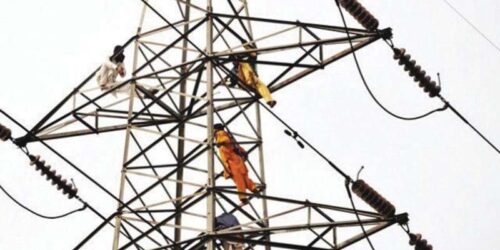The Senate Standing Committee on Power chairman has said that the Sindh police and politicians are involved in electricity theft and employees of power distribution companies are complicit in this activity.
“Electricity theft is taking place in colonies and offices of Sindh police,” said Senator Saifullah Abro, who chaired the committee meeting.
He said that in Sindh politicians were running 50 air conditioners in their homes and the employees of power distribution companies were their accomplices in the theft.
The committee meeting commenced with an overview of all policies related to guidelines for setting up independent power plants (IPPs). The Power Division secretary provided the committee with details of policies formulated in 2002, 2006 and 2015.
He informed the committee that a subsidy reform proposal had been approved by the cabinet and added that it would ensure equitable distribution of power.
It was asserted that line losses and non-recovery was one of the main reasons for the increase in circular debt.
In a similar context, the committee members inquired about the electricity units that were provided free of cost to the employees of distribution companies.
It was also stressed that the reason for line losses was the use of archaic distribution lines and machinery.
The committee asserted that urban and rural territories must be divided to ensure the ease of recovery.
Central Power Purchasing Agency (CPPA) Managing Director Waseem Mukhtar informed the committee that the power sector circular debt stood at Rs2,280 billion.
Power Secretary Ali Raza Bhutta told the committee that in future subsidy would only be provided to the poor people.
“We have paid Rs90 billion to the IPPs, which resulted in a decrease in the circular debt,” the secretary said.
He said that a loan of Rs480 billion was obtained from banks and was used for paying off circular debt. He said that bank debt “has now reached Rs800 billion”.
The National Electric Power Regulatory Autority (Nepra) has allowed 15% losses while the actual losses are around 17.4%, he added. He said that lack of investment is one of the reasons for technical losses. The annual losses due to not investing and inefficiency are Rs67 billion.
Senator Sana Jamali said that Balochistan is facing severe load-shedding these days. The power secretary said that due to disruption of supply from Iran the issue of power outages in Balochistan has exacerbated.
While discussing the performance of Quetta Electric Supply Company (Qesco), the committee members stressed the need for provision electricity to areas of Jaffarabad, Nasirabad and Gwadar. Member from the Gwadar Chamber of Commerce shared the plight of Gwadar and the way electricity shortfall and outages were shutting down businesses. The officials said that the fish export facility in Gwadar has been shut due to closure of 60 ice factories as a result of recurrent power outages in the city.
The committee chairman directed Qesco CEO to visit Gwadar at the earliest to address the issues and find alternate solutions.
Discussing the Power Purchase Agreement between National Transmission and Dispatch Company (NTDC) and K-Electric, the committee directed that details must be provided to the committee under Rule 181 of the Rules of Business and Conduct.





